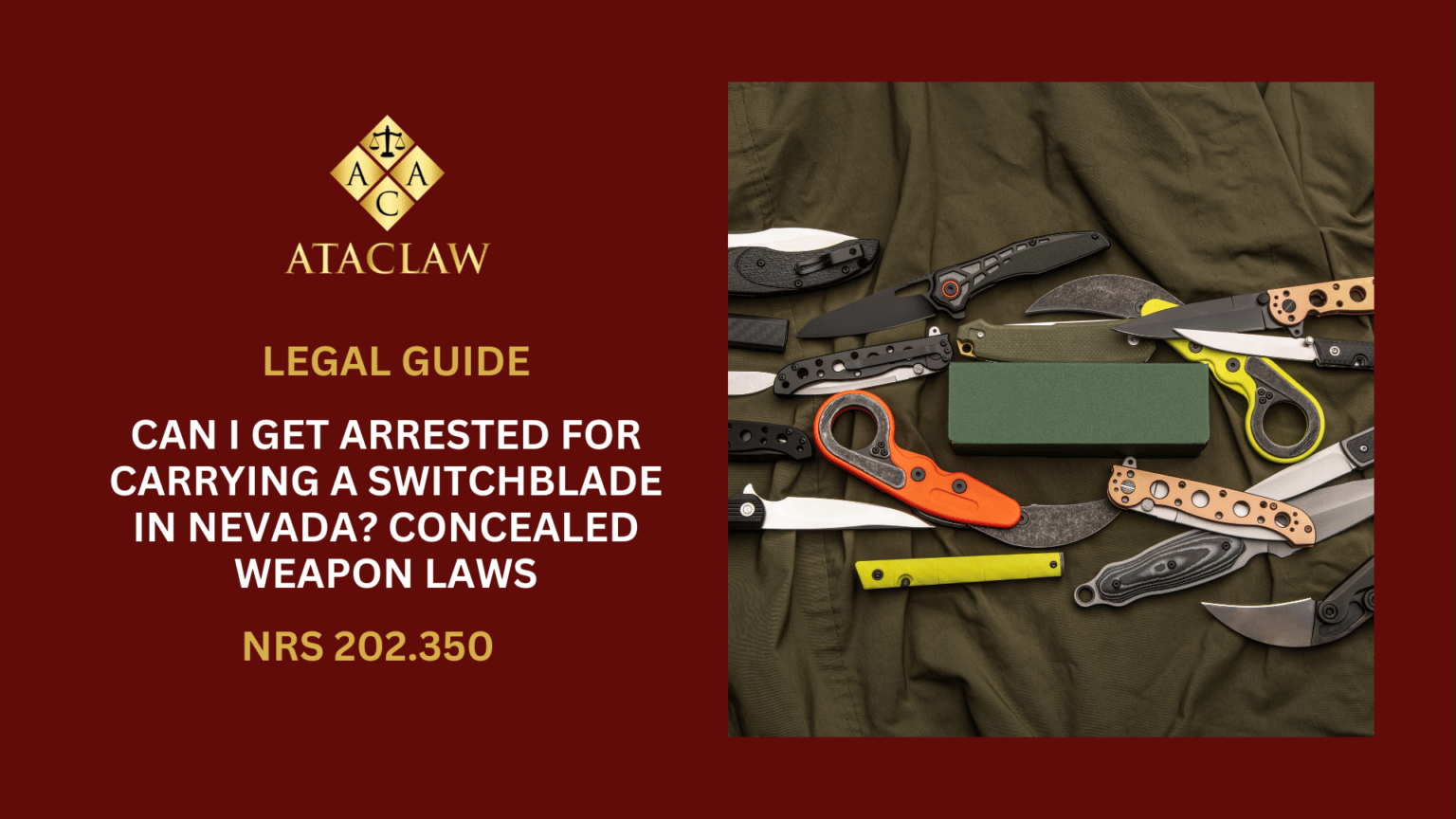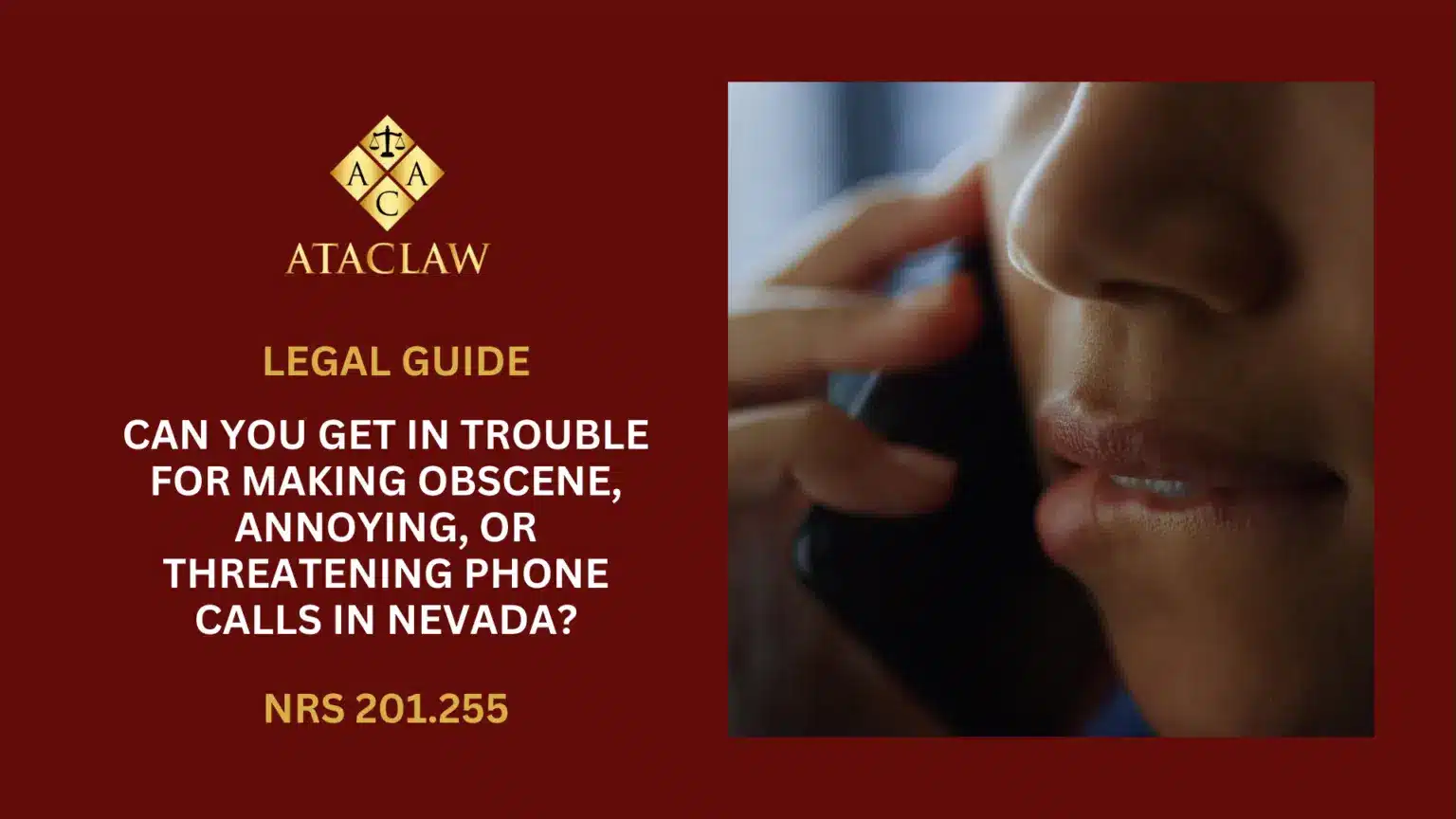In the state of Nevada, switchblades are not just relics of 1950s delinquent culture—they’re part of a complex legal landscape. According to Nevada state law (NRS 202.350), individuals are allowed to own and openly carry switchblades. However, the laws stipulate a significant caveat: carrying a concealed switchblade requires a permit issued by the local sheriff. It’s crucial to understand that local jurisdictions have the authority to impose their regulations, which might further restrict where you can openly carry these knives. For example, in Clark County, it’s illegal to openly carry any knife with a blade longer than three inches on public sidewalks.
This blog aims to shed light on the state’s regulations regarding switchblades, including the nuances of possession, open carry, and potential legal consequences for violations. Let’s explore the details to ensure you stay on the right side of the law.
How is a Switchblade Defined in Nevada?
The term “switchblade” carries a specific definition that is crucial for Nevada’s residents and visitors to understand, especially for those with a penchant for collecting knives or those simply curious about the legality of carrying certain types of knives. According to Nevada’s statutes, specifically NRS 202.265, a knife can only be classified as a “switchblade” if it meets two critical criteria:
- Blade Length: The knife must have a blade that is two (2) inches or longer. It’s important to note that the “blade” refers to the sharp part of the knife, extending from the tip down to the tang—the part of the blade that transitions into the handle or the hilt.
- Automatic Release: The knife must have a blade that springs out automatically. This automatic release can be triggered by various mechanisms, such as pressing a button or applying pressure to the handle.
It’s worth noting that if an automatic knife has a blade shorter than two (2) inches, it does not fall under the category of a switchblade within the Silver State. This definition is essential for anyone wishing to adhere to the state’s regulations and avoid unintentional legal complications.
Can I Openly Carry Switchblades in Public Areas?
While Nevada state law is relatively lenient regarding the open carry of switchblades, there are specific environments where these knives are strictly forbidden, regardless of the state’s general stance:
- Educational and Childcare Settings: It’s illegal to openly carry or conceal switchblades on the premises of schools or childcare facilities, including any vehicles associated with these venues. This restriction aims to ensure the safety and security of educational environments.
- Local Regulations: It’s important to note that local ordinances can impose additional restrictions on the open carry of switchblades. For example, in certain areas of Clark County, notably on sidewalks within unincorporated areas, openly carrying switchblades is against the law.
Given the variability of local laws across Nevada’s cities and counties, it’s crucial for knife owners to familiarize themselves with the specific regulations applicable to their location or any new area they plan to visit. Failing to comply with local knife laws can result in legal consequences, even for individuals who are otherwise law-abiding citizens.
Better Safe Than Sorry
Before venturing into a new jurisdiction within Nevada, make it a point to review both municipal and county codes relevant to knife carrying and ownership. This proactive approach will help ensure that you remain on the right side of the law, preserving your freedom while respecting local communities’ safety.
Can I Carry Switchblades Secretly or in a Concealed Manner?
In Nevada, the laws governing the concealed carry of switchblades are stringent, reflecting the state’s commitment to public safety. To legally conceal carry a switchblade, or what the state categorizes as a “dangerous or deadly weapon,” individuals are required to possess a valid and current Concealed Carry Weapons (CCW) permit.
- “Deadly Weapon” Classification: Nevada defines “deadly weapons” under NRS 193.165, which, in connection to NRS 202.265, categorically includes switchblades as prohibited items.
- “Dangerous Weapon” Designation: Additionally, NRS 392.466 classifies switchblade knives as “dangerous weapons,” further underscoring their regulated status within the state.
To understand the legal prerequisites for carrying concealed switchblades, interested parties should directly consult with their county sheriff’s office. The sheriffs are responsible for issuing CCW permits and can provide detailed instructions on the application process.
For those looking to deepen their understanding of acquiring a CCW permit in Nevada, referencing comprehensive guides on the topic is advisable. ATAC LAW frequently offers insights and resources for those aiming to comply with Nevada’s CCW regulations.
Penalties for Non-Compliance
The stakes for carrying a concealed switchblade without an appropriate CCW permit in Nevada are high. Offenders face severe legal consequences, including:
- Criminal Classification: This violation is considered a category C felony under NRS 202.350, illustrating the severity of the offense.
- Punishments: Convicted individuals may be subject to one to five years in prison, alongside the potential for fines up to $10,000, at the discretion of the presiding judge.
However, legal recourse may be available if the switchblade was discovered during an unlawful search. Successfully arguing that the evidence was obtained illegally could potentially lead to the dismissal of charges, given the weakened stance of the prosecution without this evidence.
It’s important to remember, the prohibition against carrying switchblades, whether openly or concealed, extends universally to school properties.
Can I Carry a Switchblade on School or Childcare Property in Nevada?
In Nevada, the law strictly prohibits the possession of switchblades on educational and childcare properties with specific outlined exceptions and severe penalties for violations.
Under NRS 202.265, carrying a switchblade to the following locations is explicitly illegal:
- Properties or vehicles of any public or private school,
- Properties or vehicles associated with childcare facilities.
- Properties of the Nevada System of Higher Education,
Exceptions to the Rule
There are allowances for carrying a switchblade in these restricted zones, but they require beforehand approval through proper channels. You must obtain written permission from:
- A designated authority at a childcare facility.
- The president of the college or university branch,
- The principal of the school,
It’s important to note that individuals who operate licensed childcare facilities in their homes can own a switchblade, provided they reside in those premises.
Penalties for Violation
The consequences of violating this statute are stringent:
- Legal Classification: Carrying a switchblade on school or childcare property is classified as a gross misdemeanor.
- Punishments: Penalties can include up to 364 days in jail and/or fines up to $2,000.
For students, the repercussions extend into their academic lives:
- First Offense: A minimum one-year expulsion from school.
- Subsequent Offenses: Permanent expulsion from the educational institution.
What Are the Consequences of Threatening Someone with a Switchblade in Nevada?
In Nevada, handling a switchblade or any deadly weapon in a manner that could be perceived as aggressive or threatening comes with serious legal implications, especially when such actions occur in the presence of two or more people.
Nevada Revised Statute 202.320 categorizes the act of menacingly brandishing or displaying a switchblade as a misdemeanor offense. This statute underscores the importance of responsible weapon handling and the legal boundaries within which individuals must operate.
Those found in violation of this law face considerable penalties, including:
- A possible jail sentence of up to six months,
- And/or fines reaching up to $1,000.
There’s a provision for defense in cases where the switchblade was brandished in self-defense. Understanding Nevada’s self-defense laws is crucial in these instances, as it may lead to the dismissal of charges if you can conclusively prove the action was solely for defense.
For anyone facing such charges or seeking to understand their rights under Nevada’s self-defense laws, ATAC LAW offers comprehensive advice and guidance, ensuring that individuals are well-informed and prepared to navigate the legal system effectively.
How Does Las Vegas Regulate Switchblades?
The Las Vegas Municipal Code (LVMC) governs the incorporated areas of Las Vegas, notably excluding the Las Vegas Strip. One of its specific mandates, LVMC 10.88.010, criminalizes the act of carrying a switchblade within 25 feet of areas witnessing:
- Protests,
- Picket lines,
- Rallies,
- Demonstrations,
- Public assemblies.
This rule is uniformly applied, regardless of whether the event unfolds on public property, streets, or sidewalks.
Facing the Penalties
Violating this provision can lead to significant legal repercussions, including:
- A potential jail term of up to six months,
- And/or fines amounting to $1,000.
The law underscores the city’s commitment to maintaining peace and safety during public assemblies by curtailing actions that might escalate tensions or lead to unsafe situations.
What Are Clark County’s Laws on Carrying Knives?
Understanding the nuances of local laws is crucial for residents and visitors in Clark County, an area encompassing unincorporated regions like Paradise and Spring Valley. Here’s a concise guide on what the Clark County Code (CCC) says about knife carrying, particularly concerning switchblades.
Violations of the CCC are considered misdemeanors, with penalties reaching up to six months in jail and/or fines of up to $1,000. The code delineates specific regulations for both open and concealed carrying of knives.
Open Carry Guidelines
According to CCC 14.42.056, the open carry of any knife featuring a blade longer than three inches is prohibited on public sidewalks or pedestrian easements. This rule underscores the county’s stance on public safety in accessible spaces.
Concealed Knife Carry
As per CCC 12.04.180, carrying a concealed knife with a blade of at least three inches in length without written permission from the local sheriff is also prohibited. This regulation aligns with state law (NRS 202.350) that forbids carrying concealed knives without appropriate authorization. Those interested in carrying a switchblade concealed in Clark County must seek written consent from the Clark County Sheriff’s office, ensuring compliance with current laws and regulations.
Provisions During Public Events
CCC 12.30.010 specifically addresses the carrying of switchblades in proximity to public gatherings, including:
- Protests,
- Rallies,
- Demonstrations,
- Picket lines,
- Public assemblies,
prohibiting carrying a switchblade within 25 feet of these events, irrespective of whether they occur on public property or sidewalks. This rule aims to ensure public safety during mass gatherings.
How Can Illegal Carrying of a Switchblade Affect Immigration Status?
Non-U.S. citizens charged with offenses under NRS 202.350, NRS 202.265, or NRS 202.320, which involve the illegal carrying or use of a switchblade, should be aware that these charges could potentially impact their immigration status. The risk of deportation for such violations isn’t always clear-cut.
If you’re facing such charges, it’s crucial to seek legal counsel. An attorney, particularly one with experience in immigration law, can engage with prosecutors to determine if deportation is being considered. Additionally, your lawyer can negotiate on your behalf, aiming to either have the charges dropped or reduced to offenses that do not carry the risk of deportation.
Is It Possible to Seal a Knife Offense Record in Nevada?
In Nevada, individuals convicted of a knife-related offense may have the opportunity to seal their criminal records after serving a specific waiting period, which varies according to the seriousness of the crime:
- For a Misdemeanor (e.g., brandishing a switchblade unlawfully in accordance with NRS 202.320): You can apply to have your record sealed 1 year after the conclusion of the case.
- For a Gross Misdemeanor (e.g., carrying a switchblade to a school as prohibited by NRS 202.265): The waiting period extends to 2 years following the case’s end.
- For a Category C Felony (e.g., concealing a switchblade without a permit, contrary to NRS 202.350): You must wait 5 years after the case’s closure before seeking a record seal.
It’s important to note that if your charges are dismissed, there’s no waiting period—you can immediately petition the court for a record seal. Remember, obtaining a record seal can be a complex legal process, and you might want to consult with a lawyer to ensure your request is handled properly.
Knowing the specifics of Nevada’s switchblade laws is essential for anyone wishing to possess or carry one within the state. While owning and openly carrying switchblades is generally permitted, the nuances of local restrictions and the need for a CCW permit for concealed carry highlight the importance of staying informed. Should you find yourself uncertain about the legal standing of your knife or facing charges for a switchblade-related offense, ATAC LAW is here to offer expert legal guidance and support. Remember, staying educated on state laws ensures your rights are protected while keeping you out of legal hot waters.
For further legal assistance and to discuss your case with an expert, don’t hesitate to contact ATAC LAW.




